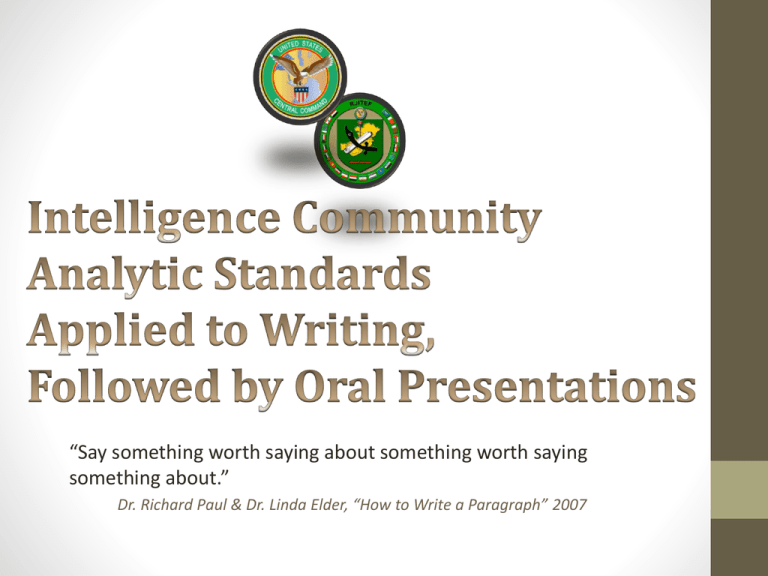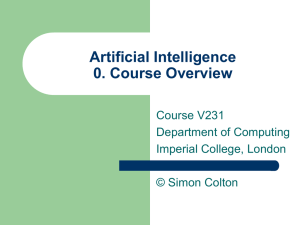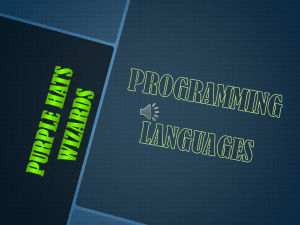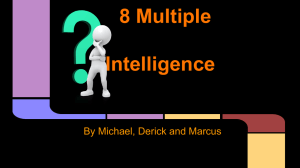Intelligence Community Analytic Standards Applied to Writing
advertisement

“Say something worth saying about something worth saying something about.” Dr. Richard Paul & Dr. Linda Elder, “How to Write a Paragraph” 2007 Objectives of This Block • Given the previous blocks on internet searching and critical thinking, and this short block on the Intelligence Community Directive (ICD) Analytic Standards, participants should • Relate a familiarity with the Analytic Standards and Compare those to standards of inquiry & research in academics or science • Recognize the similarity between “college writing” and the writing produced in the Intelligence Community • Examine a news article according to the Standards and Appraise its information value • Prepare and Deliver a short, impromptu oral presentation of individual evaluations What We Teach in the Writing Course • The Concept of Writing • Grammar (!!!) • Parts of Speech • Punctuation • Sentences and Sentence Structure Errors • Basic Argumentation • Issue • Claim • Evidence • Planning Your Document • Purpose • Audience • Outline (!!!) Intelligence On the Web • Office of the Director of National Intelligence • http://www.dni.gov/index.html • Intelligence Community “Collaboration. Commitment. Courage.” • http://www.intelligence.gov/ • Intelligence Community Directives • http://www.dni.gov/electronic_reading_room.htm ODNI Mission, Vision, and Goals Mission Lead Intelligence Integration Forge an Intelligence Community that delivers the most insightful intelligence possible. Vision A Nation made more secure because of a fully integrated Intelligence Community. Goals •Integrate intelligence analysis and collection to inform decisions made from the White House to the foxhole. •Drive responsible and secure information sharing. •Set strategic direction and priorities for national intelligence resources and capabilities. •Develop and implement Unifying Intelligence Strategies across regional and functional portfolios. •Strengthen partnerships to enrich intelligence. •Advance cutting-edge capabilities to provide global intelligence advantage. •Promote a diverse, highly-skilled intelligence workforce that reflects the strength of America. •Align management practices to best serve the Intelligence Community. Intelligence Community Directive 203 - Analytic Standards “…the writer’s original perception…may be as erroneous as the reader’s.” (Stephen King, 2000) Primary Standards • • • • • Objectivity Independent of Political Considerations Timeliness Based on All Available Sources of Intelligence Exhibits Proper Standards of Analytic Tradecraft Intelligence Community Directive 203 - Analytic Standards Sub-Standards • Properly Describes Quality & Reliability of Underlying Sources • Properly Caveats & Expresses Uncertainties or Confidence in Analytic Judgments • Properly Distinguishes between Underlying Intelligence & Analyst’s Assumptions and Judgments • Incorporates Alternative Analysis Where Appropriate • Demonstrates Relevance to U.S. National Security • Uses Logical Argumentation • Exhibits Consistency of Analysis Over Time, or Highlights Changes and Explains Rationale • Makes Accurate Judgments and Assessments Demonstration Article: The Game Goes On • Do you think the author is being objective? • Do you think this article is “pushing” a political viewpoint? • Do you think this article is using multiple, verified sources of information? • Are you confident that this article can be trusted? • Is the article structured clearly? • Does the article demonstrate consistent thought throughout? • What is the main claim of the author? • Does the author explicitly state the claim and does the author support this claim with appropriate evidence? • Does the author distinguish between assumptions and conclusions (inferences)? Structured Thinking Produces Structured Writing “…based on verifiable data as well as objective evaluation of any…evidence. It means, among other things, that personal opinions…are irrelevant. Moreover, all arguments should be supported by either primary or secondary sources, and illustrate (how)..concepts are accepted or rejected…” (http://essay-writing.suite101.com/article.cfm/how n.d.) Practice Evaluate the Article: Florida Fails on Funding • Do you think the author is being objective? • Do you think this article is “pushing” a political viewpoint? • Do you think this article is using multiple, verified sources of information? • Are you confident that this article can be trusted? • Is the article structured clearly? • Does the article demonstrate consistent thought throughout? • What is the main claim of the author? • Does the author explicitly state the claim and does the author support this claim with appropriate evidence? • Does the author distinguish between assumptions and conclusions (inferences)? Production “How do I know what I think until I can see what I say?” E.M. Forster • Write a paragraph summary of the article using your evaluation. Use proper grammar and sentence structure. Keep it at 5 sentences. What We Teach in the Oral Presentation Course • 4 Delivery Methods • The Value of Practice • Perception & the Psychology of Speech • Self-Perception & Self-Talk • The Perceptions of Others • The Brain & Speech • Language & the Exchange of Information • Non-Verbal Communication • The Presentation • Informing • Persuading Oral Presentations “We gather our ideas to put them into words and if our words aren’t empty or hollow, we might get those ideas across to a listener who can unpack our words to extract their content.” Steven Pinker Each participant will present your evaluation of the article in no more than two minutes each. Do not reference any other participant’s work. Begin by saying, “My evaluation of this article finds…” Your Words Are Your Most Important Commodity “For be it remembered that words no more than dollars are to be scattered, broadcast for the sole reason that you have them.” Greever & Bachelor, The Century Vocabulary Builder









